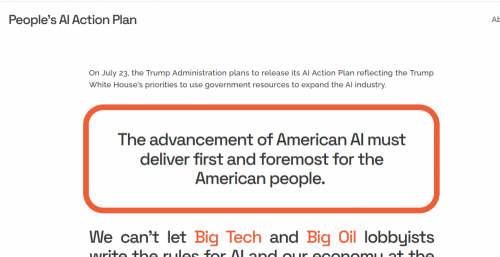What is a People’s AI Action Plan?
A People’s AI Action Plan is one that delivers on public well-being, shared prosperity, a sustainable future, and security for all. The concrete pathways for this vision will live in the collective work of the many organizations that endorse this effort, differing across issue areas and sectors—from labor to climate to children’s online safety and immigration—and united in ensuring a trajectory for AI that puts people first, rather than the interests of tech billionaires.
The signatories to this statement all have actionable ideas for an AI agenda that meets the needs of everyday people. Read more about them below:
- — Accountable Tech et al, Put the Public in the Driver’s Seat: Shadow Report to the US Senate AI Policy Roadmap
- — Accountable Tech, AI Now Institute, and EPIC, Zero Trust AI Governance
- — AI Now Institute, A Roadmap for Action: Make AI a Fight About Power, Not Progress, AI Now Landscape 2025
- — AFT | Education, Healthcare, Public Services, Commonsense Guardrails for Using Advanced Technology in Schools
- — Algorithmic Justice League, Fly Report
- — Amazon Employees for Climate Justice, Burns Trust: The Amazon Unsustainability Report
- — American Association of University Professors (AAUP), Link forthcoming
- — Athena Coalition, Comments to NTIA on data center expansion, OSTP on worker surveillance, and the White House on AI
- — BetaNYC, Achieving Digital Equity in New York State
- — Center for Democracy & Technology, AI Governance Lab
- — Center on Resilience and Digital Justice (CRDJ), Automating.nyc and datacapitalism.d4bl.org
- — Clean Air Council, How the U.S. Public and AI Experts View Artificial Intelligence
- — Collaborative Research Center for Resilience, Testimony on the Use of Automated Decision Systems and Artificial Intelligence by New York City Agencies
- — Collective Action in Tech, The Role of Workers in AI Ethics and Governance
- — Color of Change, Black Tech Agenda
- — Data & Society, Data Centers Aren't the Future of American Prosperity
- — Demand Progress Education Fund, stopdangerousai.com
- — Disability Rights Education and Defense Fund (DREDF), Disability Bias in Clinical Algorithms: Recommendations for Healthcare Organizations
- — Economic Security Project, Building a New Political Economy for AI
- — Emily M. Bender and Alex Hanna (DAIR Institute), The AI Con
- — EPIC, AI Legislation Scorecard
- — Fight for the Future, Ban Facial Recognition Campaign
- — Friends of the Earth, Report: Artificial Intelligence A Threat to Climate Change, Energy Usage and Disinformation
- — Investor Alliance for Human Rights, Salient Issue Briefing for Investors: AI and Human Rights
- — The Greenlining Institute, Building Fairer Futures: The Role of AI in Equitable Government Decision-Making
- — Kairos, MediaJustice, and Free Press, Organizer Guide: The Costs of Data Centers to Our Communities—and How to Fight Back
- — Lauren Klein and Brandeis Marshall (AIAI), A Social Justice Framework for Leveraging Data Science to Advance Gender Equity
- — Lawyers’ Committee for Civil Rights Under Law, Online Civil Rights Act
- — Local Progress & AI Now, Local leadership in the Era of Artificial Intelligence and the Tech Oligarchy
- — MAMA - Mothers Against Media Addiction, AI & Kids: What Parents Need to Know
- — MediaJustice, WTF: The Rise of the Tech Broligarchy Toolkit
— MIT Data + Feminism Lab, Data Feminism for AI
- — Morris Institute for Justice, Comments to the FTC and CFBP on AI in rental tenant screening procedures
- — National Nurses United, Nurses’ and Patients’ Bill of Rights
— New America’s Open Technology Institute, Recommendations for Development of AI Action Plan
- — New Disabled South, Priorities
- — Open Markets Institute and Mozilla, Stopping Big Tech from Becoming Big AI: A Roadmap for Using Competition Policy to Keep Artificial Intelligence Open for All
- — PowerSwitch Action, Uber’s Inequality Machine: Data on How AI-Driven Pay is Harming Workers and What We Can Do to Push Back
- — Public Citizen, Trump Administration’s Reckless AI Agenda—Just Another Corporate Giveaway
- — Public Knowledge, Trustworthy AI
- — Stop Gen AI, How to Avoid Gen AI
- — Tech Justice Law Project, Complaint, Megan Garcia v. Character Technologies et al
- — TechTonic Justice, Inescapable AI: The Ways AI Decides How Low-Income People Work, Live, Learn, and Survive
- — Towards Justice et al, Prohibiting Surveillance Prices and Wages
— UCB Labor Center, The Current Landscape of Tech and Work Policy: A Guide to Key Concepts
- — UltraViolet, AI Demands to Fight Sexism & Misogyny
- — United for Respect, The RESPECT Agenda
Shortly after taking office, President Trump issued an Executive Order on artificial intelligence which amounts to yet another massive handout to the tech industry. The Executive Order requires the development of an “AI action plan” by July 23, 2025 designed to “enhance America’s AI dominance.”
The AI industry has mounted a full-court press on Washington to shape the “AI dominance” agenda in service of their interests. The industry has ramped up lobbying efforts to attack regulation, including a recent attempt in Congress to be granted immunity from state AI laws for ten years - which was shot down in a 99-1 vote after public outcry.
The AI industry has now submitted a wishlist of policy recommendations to the writers of the action plan—a group of tech leaders with deep connections to Silicon Valley, venture capital, and the defense tech industry. This lobbying is likely to pay off exponentially, as recent reporting indicates that the Trump Administration plans to use the action plan on July 23 to celebrate the government’s commitment to “expanding” the AI industry.
One thing is certain: an AI action plan written by and for tech billionaires cannot and will not serve the interests of the broader public. We cannot let Big Tech special interests buy Washington and write the rules for AI and our economy.










